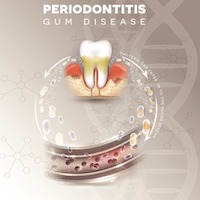Gum Disease Can Progress If Not Treated
June 27th, 2021We often speak about the most common form of gum disease, gingivitis which is also the mildest form of gum disease. But gingivitis still needs to be taken seriously. It occurs when plaque, an invisible, sticky substance, turns into tartar, also known as calculus. The longer the tartar remains, the harder it is to remove from your teeth and gums. Your gingiva (the part of the gum around the base of your teeth) become irritated. Professional intervention is necessary to thwart the progression of the disease, and more stringent oral hygiene at home may be required.
The bacteria associated with gingivitis can also get into the bloodstream and contribute to many systemic diseases due to the inflammation it creates in the gums.
 Periodontitis
Periodontitis
When gingivitis isn’t properly treated, it can turn into a more severe form of gum disease called periodontitis. At this stage, the alveolar bone structure and fibers that also support your teeth can be damaged. Your gums may even appear to pull away from your teeth. The systemic links are similar to that of the earliest stages of gum disease, but can even be worse.
Treatment for Severe Gum Disease
Professional cleaning called scaling and root planing is recommended, at least twice a year. The goal is to clean pockets of disease around the teeth. If you are diagnosed with advanced periodontitis, surgical intervention may be necessary in order to try to save your teeth. Procedures may include surgery such as LANAP ® laser-assisted new regeneration attachment procedure and regenerative periodontal surgery with bone and tissue grafts (guided tissue regeneration) to try to regenerate bone or gum tissue.
Watch out For Symptoms
If you are experiencing any of the following symptoms, you should consult your periodontal professional:
- Tender, puffy or swollen gums
- Dark red dark gums
- Gums that bleed when you brush or floss
- Receding gums
- Bad breath that isn’t due to another issue
Our doctors are experts at treating the diseased tissue and bacteria of gum disease with non-surgical procedures and laser treatments like LANAP® . For more information, call our office at 215-677-8686 or email us today.
